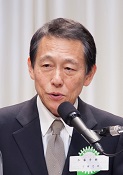Will the Trump Phenomenon Occur in Japan?
November 30, 2016
Mr. Hideki Kato
President, Japan Initiative
�� Since Donald Trump won the Presidential Election on November 8th, there has been extensive media coverage here in Japan, as well. Today, let me elaborate on how we should face the complex modern society that has given rise to the Trump Phenomenon and Brexit (Britain leaving the European Union). My views may sound somewhat unconventional but hopefully not misleading.
Since Donald Trump won the Presidential Election on November 8th, there has been extensive media coverage here in Japan, as well. Today, let me elaborate on how we should face the complex modern society that has given rise to the Trump Phenomenon and Brexit (Britain leaving the European Union). My views may sound somewhat unconventional but hopefully not misleading.
��I recently had an opportunity to hear the speech made by the late Prime Minister Masayoshi Ohira. I was impressed aback by his warning made 40 years ago. He stated we had to reframe our mindset and redirect the way how we operate our society, politics, family and businesses modeled on modern economic growth. Today, we find ourselves confronted with widening disparity and unexpected outcomes in politics and economies, centered on the buzzwords like populism, anti-globalism and anti-establishment. Let me highlight here the fact that half of the voters in the USA and the UK voted ��yes�� for Donald Trump and Brexit. We must not overlook the essential factor that affected voters�� decision and its significant consequences.
��The rise of populism proves that political parties have failed to tackle challenging issues caused by globalization. When policymakers have no alternatives or options to offer to the people, they tend to pay mere lip service to attract support. I must say anti-globalization movements are not new and date back to the 1980s. People have long advocated for tackling various issues, including the environment, human rights, conflicts and the North-South Issue. Conventional responses gave an oversimplified formula that economic growth through liberalization would solve everything. As we all know, it exacerbated globalization and consequently, we got stuck in a negative spiral.
��We have witnessed massive anti-globalization demonstrations at international conferences associated with economic globalization. The World Trade Organization Ministerial Conference of 1999 in Seattle failed to produce any significant outcome, as negotiations were overshadowed by nearly 70,000 protesters who took to the streets. Again in 2001, when the G8 Summit was convened in Genoa, a massive number of nearly 300,000 protested against globalization. In a growing number of European countries, radical right-wing parties have made electoral gains since 2000, ranging across a wide policy spectrum from anti-globalization, anti-establishment to nationalism. I observe the underlying issue is how to eliminate negative effects caused by manipulating and institutionalizing the process towards globalization and liberalization. Economic science has it that liberalization will stimulate productive economic activities, increase income and lead to happiness. However, the harsh reality proves that companies can face fierce competition and the wealth inequality can exacerbate. I must say decades of such aggravating situation has fueled resentment against the political and business establishment which populists have been able to exploit, as we witnessed in the USA and the UK.
��Now, let us turn our eyes to Japan. Will the Trump Phenomenon occur and how widespread is the support for populism in this country? Japan embarked on structural reform initiatives about a score of years ago but I must say the implementation of reforms has mostly fallen short, including the recent ��third arrow�� of the Abenomics economic policy. While the USA and the UK have been the leading runners in globalization and liberalization, Japan lags far behind, making us somehow immune to the factors that had given rise to the Trump Phenomenon and Brexit. I must also highlight each phase of the reform in this country backed by an enormous amount of public spending, which to me is nothing but a populist measure going unchecked. I think this ��Japanese-style chronic populism�� has served to attract high approval ratings from voters and to narrow the gap between the elite and the rest of the society, which eventually discouraged the rise of the Trump Phenomenon. But there surely is a drawback to this age-long measure, resulting in a massive budget deficit of 1,000 trillion yen. We now have to pay the price.
��Before I close my speech, let me share one of the programs conducted by the ��Japan Initiative�� with the goal to restore a healthy democracy. In 2002, we started a ��public spending review�� and have held 220 review meetings at different local municipalities, where the reviewers engage in extensive discussions on the importance and legitimacy of public projects in a transparent manner. More recently, we started to randomly select about 1,000 people and sent them invitation letters to enhance an inclusive review process based on active citizen participation. On average, around 50 people replied with positive responses. To date, about 6,300 people have participated and engaged in fruitful discussions, serving as excellent judges. We have noticed many of them became more interested in politics and public administration as ��their own business�� after taking part in the review process. They also became more socially engaged in their own community. If such people continue to increase in number, I think we can prevent radical movements like the Trump Phenomenon and restore a sound basis for democracy.
The ultimate goal of politics and economic growth is to make people happy.
��Liberalization was simply a means to achieve growth. Unfortunately, we have confused the end goal with the means goal. As the late Prime Minister Ohira pointed out, we must reframe our mindset and redirect the course of politics and economy to serve its ultimate goal.